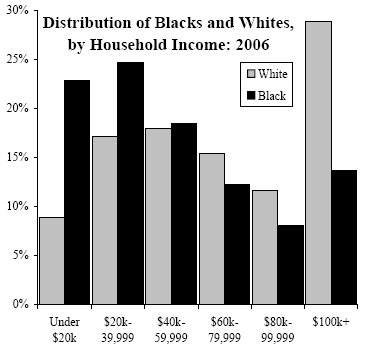
When Usain Bolt broke the world record in the 100 meter footrace, did that mean the average speed of humans on earth has increased? No. People may be faster on average than they were 1000 years ago, what with improved health and nutrition, but we've also got more old people around now than we used to, and the obesity epidemic can't be helping. But even if people are getting faster, that's not why Bolt broke the record. The record fell because of improved selection and preparation of athletes, a process that is making only the very best athletes better and better - and leaving the rest of us in the dust.
What does that have to do with racial inequality in America? Well, Barack Obama's success might mean the average Black person in America is doing better than before, but he is not extremely successful because most Blacks are doing better compared with Whites. What happens at the tails of the distribution - out at the extremes, where the fastest people run, and the most successful minorities thrive - is not a good measure of what's happening at the middle of the distribution, where the average is found. As the evolutionary biologist Stephen Jay Gould so eloquently explained, neither the extreme nor the average is the whole truth.
The New York Times on August 25 raised the problem that Obama's success will only encourage those who already see racism and racial inequality as a thing of the past. The article quoted demographer Roderick Harrison (a former mentor of mine at the U.S. Census Bureau who now works at the Joint Center for Political and Economic Studies), who worried: "That is the danger, that we declare victory. . . . Historic as this moment is, it does not signify a major victory in the ongoing, daily battle."
Abigail Thernstrom, on the extreme end of what worries Harrison, was quoted to say: "It says that the road we started down in 1965 with the Voting Rights Act has come to an end."
Quick detour to some facts on income and management. Obama is out on the tail of the Black income distribution, obviously, as is McCain. But regardless of how many homes there are out on the tails, the Black-White difference in the household income distributions is steep. Income differences have improved over the long run, but 48% of Blacks still live in households with incomes less than $40,000, compared with 26% of Whites. And Whites are more than twice as likely to live in $100k-plus households. (For all official income, poverty and employment statistics, remember incarcerated people are not counted.)

Source: Cohen's calculations from U.S. Census Bureau report.
On management, presidents are top managers. Whether Obama gets the job or not, though, a recent study Matt Huffman and I conducted found that more than half (53%) of Black workers find themselves under managers who don't represent their workforces in terms of Black composition (we studied all private sector establishments that report to the EEOC). Regardless of the reasons (and racism is just one of them), most Blacks work for Whites.
Out on the tail of the success distribution, there are reasons Black politicians can do better now than they could before. Some of those reasons are cause for celebration (more Whites are willing to vote across the color line) and some aren't (he proves again that one way to get ahead is not to talk about racial inequality too much). Obama's success could make things better for Blacks in America in the future. We just have to make sure we don't assume that success for the average person is what propelled him way out onto history's tail.